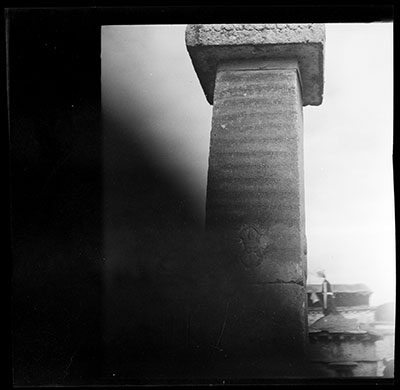
2001.59.17.84.1 (Film negative)


2001.59.17.84.1 (Film negative)

Hugh E. Richardson
Hugh Richardson
1949
Phenpo Valley Region > Gyal
2001.59.17.84.1
55 x 55 mm
Negative film nitrate
Donated August 2001
The executors of the estate of Hugh E. Richardson
Hugh E. Richardson
Manual Catalogues - Notes on negative album (outer case) - 'INSCRIPTIONS ON RDO RINGS' (in black ink on white label) and 'Inscriptions & misc.' (in black ink on yellow label) is written in Richardson's hand on the cover of the negative album. [KC 21/9/2006]
Manual Catalogues - Notes on negative index - [Rgyal]
Other Information - Background: Richardson discusses the site in High Peaks, Pure Earth , London, Serindia Publications, 1998, "Near the head of the 'Phan-po valley is the temple of Rgyal (1949), founded in 1012 by Zhang Sna-nam Rdo-rje dbang-phyug, whose family was related by marriage to the Tibetan kings. In front of the temple is a tall stone pillar with a partly damaged inscription of no real historical interest. The temple, formerly famed for its wealth, was looted and damaged by fire by the invading Mongols in 1280 ... The original name of the temple was Rgyal Lug-lhas, "The Sheepfold"." (p. 309) [KC 27/9/2006]
For Citation use:
The Tibet Album.
"Inscription pillar at Gyal in the Phenpo valley"
05 Dec. 2006. The Pitt Rivers Museum.
<http://tibet.prm.ox.ac.uk/photo_2001.59.17.84.1.html>.
For more information about photographic usage or to order prints, please visit the The Pitt Rivers Museum.
© The Pitt Rivers Museum